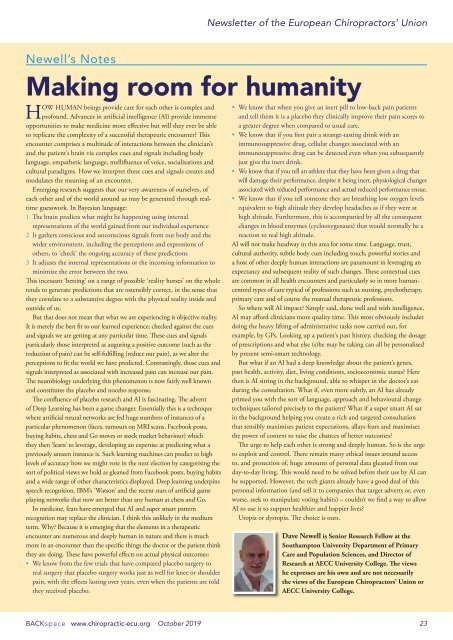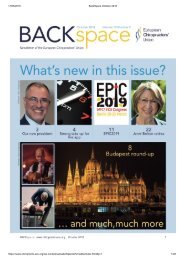Backspace Oct19
Backspace Oct19
Backspace Oct19
Create successful ePaper yourself
Turn your PDF publications into a flip-book with our unique Google optimized e-Paper software.
Newsletter of the European Chiropractors’ Union<br />
Newell’s Notes<br />
Making room for humanity<br />
HOW HUMAN beings provide care for each other is complex and<br />
profound. Advances in artificial intelligence (AI) provide immense<br />
opportunities to make medicine more effective but will they ever be able<br />
to replicate the complexity of a successful therapeutic encounter? This<br />
encounter comprises a multitude of interactions between the clinician’s<br />
and the patient’s brain via complex cues and signals including body<br />
language, empathetic language, mellifluence of voice, socialisations and<br />
cultural paradigms. How we interpret these cues and signals creates and<br />
modulates the meaning of an encounter.<br />
Emerging research suggests that our very awareness of ourselves, of<br />
each other and of the world around us may be generated through realtime<br />
guesswork. In Bayesian language:<br />
1 The brain predicts what might be happening using internal<br />
representations of the world gained from our individual experience<br />
2 It gathers conscious and unconscious signals from our body and the<br />
wider environment, including the perceptions and expressions of<br />
others, to ‘check’ the ongoing accuracy of these predictions<br />
3 It adjusts the internal representations or the incoming information to<br />
minimize the error between the two.<br />
This incessant ‘betting’ on a range of possible ‘reality horses’ on the whole<br />
tends to generate predictions that are ostensibly correct, in the sense that<br />
they correlate to a substantive degree with the physical reality inside and<br />
outside of us.<br />
But that does not mean that what we are experiencing is objective reality.<br />
It is merely the best fit to our learned experience; checked against the cues<br />
and signals we are getting at any particular time. These cues and signals<br />
particularly those interpreted as auguring a positive outcome (such as the<br />
reduction of pain) can be self-fulfilling (reduce our pain), as we alter the<br />
perceptions to fit the world we have predicted. Contrastingly, those cues and<br />
signals interpreted as associated with increased pain can increase our pain.<br />
The neurobiology underlying this phenomenon is now fairly well known<br />
and constitutes the placebo and nocebo response.<br />
The confluence of placebo research and AI is fascinating. The advent<br />
of Deep Learning has been a game changer. Essentially this is a technique<br />
where artificial neural networks are fed huge numbers of instances of a<br />
particular phenomenon (faces, tumours on MRI scans, Facebook posts,<br />
buying habits, chess and Go moves or stock market behaviour) which<br />
they then ‘learn’ to leverage, developing an expertise at predicting what a<br />
previously unseen instance is. Such learning machines can predict to high<br />
levels of accuracy how we might vote in the next election by categorising the<br />
sort of political views we hold as gleaned from Facebook posts, buying habits<br />
and a wide range of other characteristics displayed. Deep learning underpins<br />
speech recognition, IBM’s ‘Watson’ and the recent stars of artificial game<br />
playing networks that now are better than any human at chess and Go.<br />
In medicine, fears have emerged that AI and super smart pattern<br />
recognition may replace the clinician. I think this unlikely in the medium<br />
term. Why? Because it is emerging that the elements in a therapeutic<br />
encounter are numerous and deeply human in nature and there is much<br />
more in an encounter than the specific things the doctor or the patient think<br />
they are doing. These have powerful effects on actual physical outcomes:<br />
• We know from the few trials that have compared placebo surgery to<br />
real surgery that placebo surgery works just as well for knee or shoulder<br />
pain, with the effects lasting over years, even when the patients are told<br />
they received placebo.<br />
• We know that when you give an inert pill to low-back pain patients<br />
and tell them it is a placebo they clinically improve their pain scores to<br />
a greater degree when compared to usual care.<br />
• We know that if you first pair a strange-tasting drink with an<br />
immunosuppressive drug, cellular changes associated with an<br />
immunosuppressive drug can be detected even when you subsequently<br />
just give the inert drink.<br />
• We know that if you tell an athlete that they have been given a drug that<br />
will damage their performance, despite it being inert, physiological changes<br />
associated with reduced performance and actual reduced performance ensue.<br />
• We know that if you tell someone they are breathing low oxygen levels<br />
equivalent to high altitude they develop headaches as if they were at<br />
high altitude. Furthermore, this is accompanied by all the consequent<br />
changes in blood enzymes (cyclooxygenases) that would normally be a<br />
reaction to real high altitude.<br />
AI will not make headway in this area for some time. Language, trust,<br />
cultural authority, subtle body cues including touch, powerful stories and<br />
a host of other deeply human interactions are paramount in leveraging an<br />
expectancy and subsequent reality of such changes. These contextual cues<br />
are common in all health encounters and particularly so in more humancentred<br />
types of care typical of professions such as nursing, psychotherapy,<br />
primary care and of course the manual therapeutic professions.<br />
So where will AI impact? Simply said, done well and with intelligence,<br />
AI may afford clinicians more quality time. This most obviously includes<br />
doing the heavy lifting of administrative tasks now carried out, for<br />
example, by GPs. Looking up a patient’s past history, checking the dosage<br />
of prescriptions and what else (s)he may be taking can all be personalised<br />
by present semi-smart technology.<br />
But what if an AI had a deep knowledge about the patient’s genes,<br />
past health, activity, diet, living conditions, socioeconomic status? Here<br />
then is AI sitting in the background, able to whisper in the doctor’s ear<br />
during the consultation. What if, even more subtly, an AI has already<br />
primed you with the sort of language, approach and behavioural change<br />
techniques tailored precisely to the patient? What if a super smart AI sat<br />
in the background helping you create a rich and targeted consultation<br />
that sensibly maximises patient expectations, allays fears and maximises<br />
the power of context to raise the chances of better outcomes?<br />
The urge to help each other is strong and deeply human. So is the urge<br />
to exploit and control. There remain many ethical issues around access<br />
to, and protection of, huge amounts of personal data gleaned from our<br />
day-to-day living. This would need to be solved before their use by AI can<br />
be supported. However, the tech giants already have a good deal of this<br />
personal information (and sell it to companies that target adverts or, even<br />
worse, seek to manipulate voting habits) – couldn’t we find a way to allow<br />
AI to use it to support healthier and happier lives?<br />
Utopia or dystopia. The choice is ours.<br />
Dave Newell is Senior Research Fellow at the<br />
Southampton University Department of Primary<br />
Care and Population Sciences, and Director of<br />
Research at AECC University College. The views<br />
he expresses are his own and are not necessarily<br />
the views of the European Chiropractors’ Union or<br />
AECC University College.<br />
BACKspace www.chiropractic-ecu.org October 2019 23<br />
01-32 <strong>Backspace</strong> <strong>Oct19</strong>.indd 23 10/09/2019 16:14





